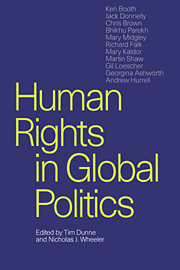Book contents
- Frontmatter
- Contents
- List of contributors
- Preface and acknowledgements
- Introduction: human rights and the fifty years' crisis
- I Theories of human rights
- II The practices of human wrongs
- 6 The challenge of genocide and genocidal politics in an era of globalisation
- 7 Transnational civil society
- 8 Global voices: civil society and the media in global crises
- 9 Refugees: a global human rights and security crisis
- 10 The silencing of women
- 11 Power, principles and prudence: protecting human rights in a deeply divided world
- 12 Learning beyond frontiers
- Index
12 - Learning beyond frontiers
Published online by Cambridge University Press: 05 June 2012
- Frontmatter
- Contents
- List of contributors
- Preface and acknowledgements
- Introduction: human rights and the fifty years' crisis
- I Theories of human rights
- II The practices of human wrongs
- 6 The challenge of genocide and genocidal politics in an era of globalisation
- 7 Transnational civil society
- 8 Global voices: civil society and the media in global crises
- 9 Refugees: a global human rights and security crisis
- 10 The silencing of women
- 11 Power, principles and prudence: protecting human rights in a deeply divided world
- 12 Learning beyond frontiers
- Index
Summary
Students have traditionally played a prominent role in calling for political change. Student groups – then small – were on the barricades of nineteenth-century Europe in opposition to authoritarian regimes. They took to the streets in much larger groups in the 1960s to attack the US war in Vietnam and the racist regime in South Africa. Since the end of the Cold War their political prominence has been greatest in the area of human rights and – surprisingly so to some – in tough regimes in Asia rather than in the liberal West. Student protests have been seen in South Korea, Indonesia and Burma, and most dramatically in Tiananmen Square in Beijing in 1989, resulting in the infamous massacre.
The particular role of students as agents of progressive change was stressed by Daw Aung San Suu Kyi in an address to the American University in Washington in January 1997. The address was delivered by her husband; not because – as is widely believed – she is unable to leave Burma but because she foregoes this freedom in order to continue the struggle against tyranny with other pro-democracy campaigners. In the address, she drew attention to the tradition in modern Burmese history of student opposition to authoritarianism. Her speech also contained important universalist references: to the ‘human predilection for fair play and compassion’; to the belief that the ‘cause of liberty and justice finds sympathetic responses around the world’; to the certainty that ‘[t]hinking and feeling people everywhere’ understand ‘the deeply rooted human need for a meaningful existence that goes beyond the mere gratification of material desires’.
- Type
- Chapter
- Information
- Human Rights in Global Politics , pp. 303 - 328Publisher: Cambridge University PressPrint publication year: 1999
- 4
- Cited by



